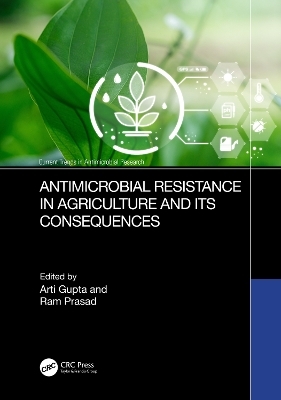
Antimicrobial Resistance in Agriculture and its Consequences
CRC Press (Verlag)
978-1-032-21644-7 (ISBN)
Students, researchers, scientists, practitioners, academics, computational biologists, stakeholders, and policymakers can benefit from using Antimicrobial Resistance in Agriculture and its Consequences as a resource that addresses microbial biotechnology, microbiology, ethnopharmacology, toxicology, medicinal plant products, and all disciplines related to antimicrobial research.
Features of the book:
Covers antimicrobial resistance in agriculture with up-to-date research
Includes recent references on each plausible antimicrobial resistance in agriculture
Details the possible spread of antibiotic resistance bacteria from animals to humans
Provides several perspectives in the resistance flux with modern agricultural practices
Describes the public health impact of the use of antibiotics in agriculture
Presents cutting-edge research on epigenetics, nanotechnology, and emergent antimicrobial technologies
Outlines recent laws and regulatory guidelines in the federal agency, responsibility, and authority
Arti Gupta, Ph.D., obtained her doctorate from Mahatma Jyotiba Phule Rohilkhand University, Bareilly, India, in 2010 in animal science. Dr. Gupta’s current research interests include animal biotechnology, molecular plant biotechnology, molecular animal biotechnology, bioprocess technology, and microbiology. Since July 2014, Dr. Gupta has been employed at Shri Avadh Raj Singh Smarak Degree College, Gonda, Uttar Pradesh, India, and has been engaged in editorial work with Springer Nature. Dr. Gupta has 10 years of teaching and research experience in plant and animal biotechnology and microbial biotechnology; in 2023–24 she served as external examiner for central evaluation at MJP Rohilkhand University, Bareilly. Dr. Gupta has been awarded University Topper (Gold Medal), M.Sc. (Biotech.) by Ch.C.S.University, Meerut; Young Scientist Award (Gold Medal) by the Zoological Society of India, Lucknow; Best Poster Presenter awarded by Asian Journal of Experimental Science, Jaipur; Best Poster Presenter by International Consortium of Contemporary Biologists (ICCB) and Madhawai-Shyam Educational Trust, Ranchi; Fellowship Award by International Consortium of Contemporary Biologist (FICCB) and Madhawi Shayam Educational Trust (FMSET); and Dr. V.P. Agarwal (Gold Medal) by D.A.V. (P.G.) College, Muzaffarnagar. She has published 1 monograph, 7 book chapters, around 50 National and International research papers, and 9 edited books; she has presented 28 abstracts in national and international symposia/seminars/conferences/workshops. Dr. Gupta has lifetime membership of the Indian Science Congress Association, Biotech Research Society of India, Zoological Society of India, and International Consortium of Contemporary Biologists. She has served as a member of several editorial boards. Previously, Dr. Gupta was employed as Teaching Personnel, G.B. Pantnagar University, Pantnagar, Uttrakhand, India, and Visiting Academic Researcher, Biorefining and Advanced Material Research Center (BAMRC), Scotland’s Rural College (SRUC), University of Edinburgh, Scotland, United Kingdom. Ram Prasad, Ph.D. is associated with the Department of Botany, Mahatma Gandhi Central University, Motihari, Bihar, India. His research interests include applied and environmental microbiology, plant-microbe interactions, sustainable agriculture, and nanobiotechnology. Dr. Prasad has more than 275 publications (total citations 13,840 with an h-index 59, i10-index 189) to his credit, including research papers, review articles, and book chapters, as well as seven patents issued or pending, and he has edited or authored several books. Dr. Prasad has 14 years of teaching experience and has been awarded the Young Scientist Award and Prof. J.S. Datta Munshi Gold Medal by the International Society for Ecological Communications; Fellowship of Biotechnology Research Society of India; Fellow of Agricultural Technology Development Society, India; Fellow of the Society for Applied Biotechnology; the American Cancer Society UICC International Fellowship for Beginning Investigators, United States; Outstanding Scientist Award in the field of Microbiology; and BRICPL Science Investigator Award and Research Excellence Award. He served as a member of several editorial boards. Previously, Dr. Prasad served as Assistant Professor at Amity University Uttar Pradesh, India; Visiting Assistant Professor, Whiting School of Engineering, Department of Mechanical Engineering at Johns Hopkins University, Baltimore, United States; and Research Associate Professor at the School of Environmental Science and Engineering, Sun Yat-Sen University, Guangzhou, China.
Antimicrobial Resistance: Causes, Effects, and Mitigation
Antibiotic resistance from theory to facts
Aspects Of Antimicrobial Resistance in Agriculture- Mechanism, Types and Prospects
Application of Nano-biotechnology in Detection and Diagnosis of Phyto-pathogens
Antimicrobial Resistance in Agrarian Distress
Host plant resistance approach against insect pest and their sustainable management
Sustainable management practices in contrast to Pod borer, Helicoverpa armigera (Hubner) in chickpea
Recent trends in antimicrobial drug resistance and implications for the needs of microbial toxicology research
Applications of Artificial Intelligence in Antimicrobial Research: An Emerging Tool for Translational Research
A Tracking of Antimicrobial Resistance through Metagenomics
| Erscheinungsdatum | 02.03.2024 |
|---|---|
| Reihe/Serie | Current Trends in Antimicrobial Research |
| Zusatzinfo | 20 Tables, black and white; 37 Line drawings, black and white; 37 Illustrations, black and white |
| Verlagsort | London |
| Sprache | englisch |
| Maße | 178 x 254 mm |
| Gewicht | 540 g |
| Themenwelt | Naturwissenschaften ► Biologie ► Botanik |
| Technik ► Umwelttechnik / Biotechnologie | |
| Weitere Fachgebiete ► Land- / Forstwirtschaft / Fischerei | |
| ISBN-10 | 1-032-21644-1 / 1032216441 |
| ISBN-13 | 978-1-032-21644-7 / 9781032216447 |
| Zustand | Neuware |
| Informationen gemäß Produktsicherheitsverordnung (GPSR) | |
| Haben Sie eine Frage zum Produkt? |
aus dem Bereich


